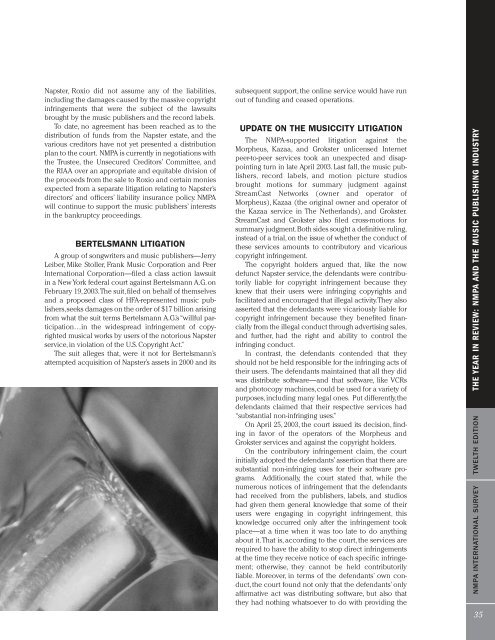NMPA_International_Survey_12th_Edition
NMPA_International_Survey_12th_Edition
NMPA_International_Survey_12th_Edition
Create successful ePaper yourself
Turn your PDF publications into a flip-book with our unique Google optimized e-Paper software.
Napster, Roxio did not assume any of the liabilities,<br />
including the damages caused by the massive copyright<br />
infringements that were the subject of the lawsuits<br />
brought by the music publishers and the record labels.<br />
To date, no agreement has been reached as to the<br />
distribution of funds from the Napster estate, and the<br />
various creditors have not yet presented a distribution<br />
plan to the court. <strong>NMPA</strong> is currently in negotiations with<br />
the Trustee, the Unsecured Creditors’ Committee, and<br />
the RIAA over an appropriate and equitable division of<br />
the proceeds from the sale to Roxio and certain monies<br />
expected from a separate litigation relating to Napster’s<br />
directors’ and officers’ liability insurance policy. <strong>NMPA</strong><br />
will continue to support the music publishers’ interests<br />
in the bankruptcy proceedings.<br />
BERTELSMANN LITIGATION<br />
A group of songwriters and music publishers—Jerry<br />
Leiber, Mike Stoller, Frank Music Corporation and Peer<br />
<strong>International</strong> Corporation—filed a class action lawsuit<br />
in a New York federal court against Bertelsmann A.G.on<br />
February 19,2003.The suit,filed on behalf of themselves<br />
and a proposed class of HFA-represented music publishers,seeks<br />
damages on the order of $17 billion arising<br />
from what the suit terms Bertelsmann A.G.’s “willful participation…in<br />
the widespread infringement of copyrighted<br />
musical works by users of the notorious Napster<br />
service, in violation of the U.S. Copyright Act.”<br />
The suit alleges that, were it not for Bertelsmann’s<br />
attempted acquisition of Napster’s assets in 2000 and its<br />
subsequent support, the online service would have run<br />
out of funding and ceased operations.<br />
UPDATE ON THE MUSICCITY LITIGATION<br />
The <strong>NMPA</strong>-supported litigation against the<br />
Morpheus, Kazaa, and Grokster unlicensed Internet<br />
peer-to-peer services took an unexpected and disappointing<br />
turn in late April 2003. Last fall, the music publishers,<br />
record labels, and motion picture studios<br />
brought motions for summary judgment against<br />
StreamCast Networks (owner and operator of<br />
Morpheus), Kazaa (the original owner and operator of<br />
the Kazaa service in The Netherlands), and Grokster.<br />
StreamCast and Grokster also filed cross-motions for<br />
summary judgment.Both sides sought a definitive ruling,<br />
instead of a trial,on the issue of whether the conduct of<br />
these services amounts to contributory and vicarious<br />
copyright infringement.<br />
The copyright holders argued that, like the now<br />
defunct Napster service, the defendants were contributorily<br />
liable for copyright infringement because they<br />
knew that their users were infringing copyrights and<br />
facilitated and encouraged that illegal activity.They also<br />
asserted that the defendants were vicariously liable for<br />
copyright infringement because they benefited financially<br />
from the illegal conduct through advertising sales,<br />
and further, had the right and ability to control the<br />
infringing conduct.<br />
In contrast, the defendants contended that they<br />
should not be held responsible for the infringing acts of<br />
their users. The defendants maintained that all they did<br />
was distribute software—and that software, like VCRs<br />
and photocopy machines,could be used for a variety of<br />
purposes,including many legal ones. Put differently,the<br />
defendants claimed that their respective services had<br />
“substantial non-infringing uses.”<br />
On April 25, 2003, the court issued its decision, finding<br />
in favor of the operators of the Morpheus and<br />
Grokster services and against the copyright holders.<br />
On the contributory infringement claim, the court<br />
initially adopted the defendants’assertion that there are<br />
substantial non-infringing uses for their software programs.<br />
Additionally, the court stated that, while the<br />
numerous notices of infringement that the defendants<br />
had received from the publishers, labels, and studios<br />
had given them general knowledge that some of their<br />
users were engaging in copyright infringement, this<br />
knowledge occurred only after the infringement took<br />
place—at a time when it was too late to do anything<br />
about it.That is, according to the court, the services are<br />
required to have the ability to stop direct infringements<br />
at the time they receive notice of each specific infringement;<br />
otherwise, they cannot be held contributorily<br />
liable. Moreover, in terms of the defendants’ own conduct,<br />
the court found not only that the defendants’ only<br />
affirmative act was distributing software, but also that<br />
they had nothing whatsoever to do with providing the<br />
<strong>NMPA</strong> INTERNATIONAL SURVEY TWELTH EDITION THE YEAR IN REVIEW: <strong>NMPA</strong> AND THE MUSIC PUBLISHING INDUSTRY<br />
35


